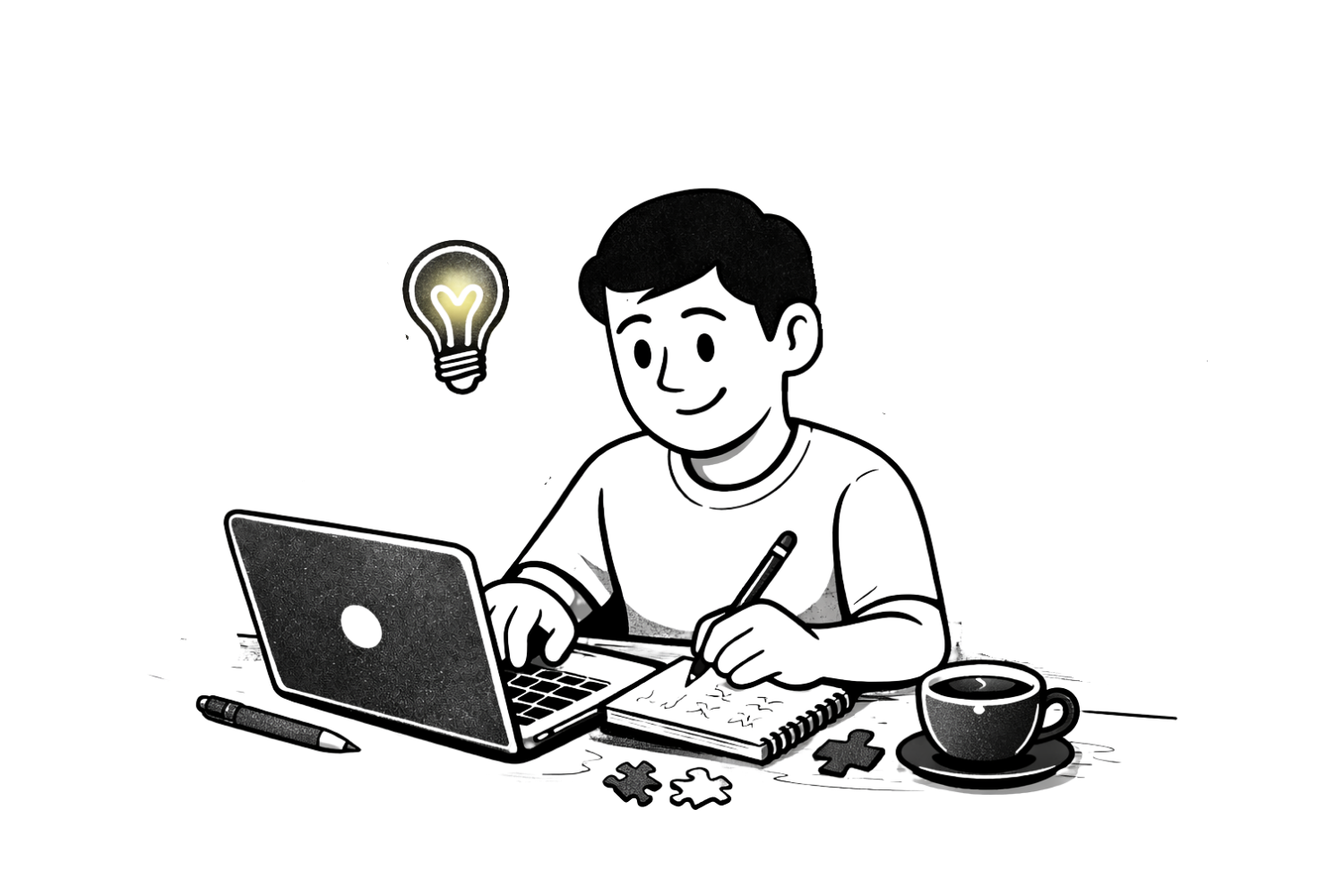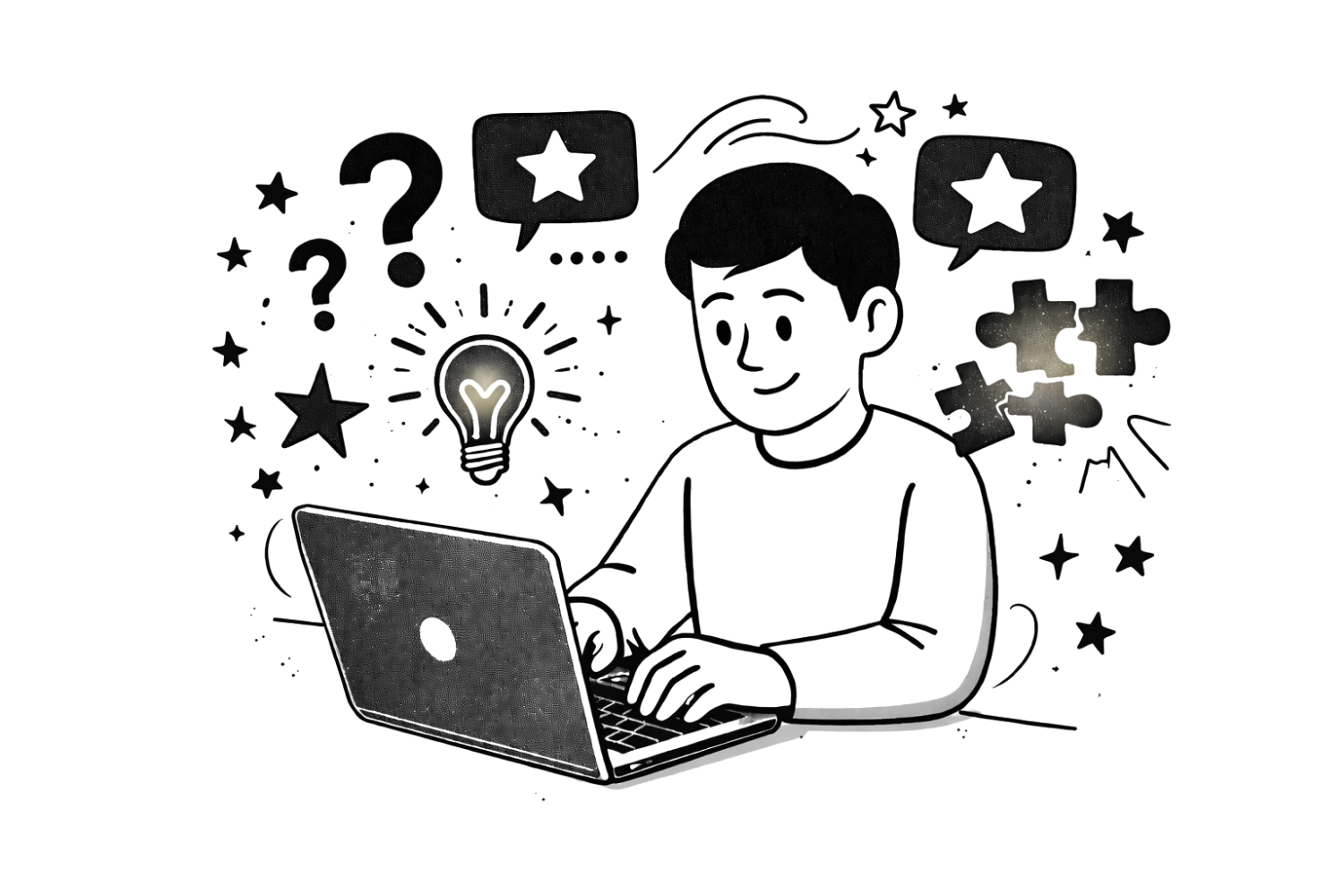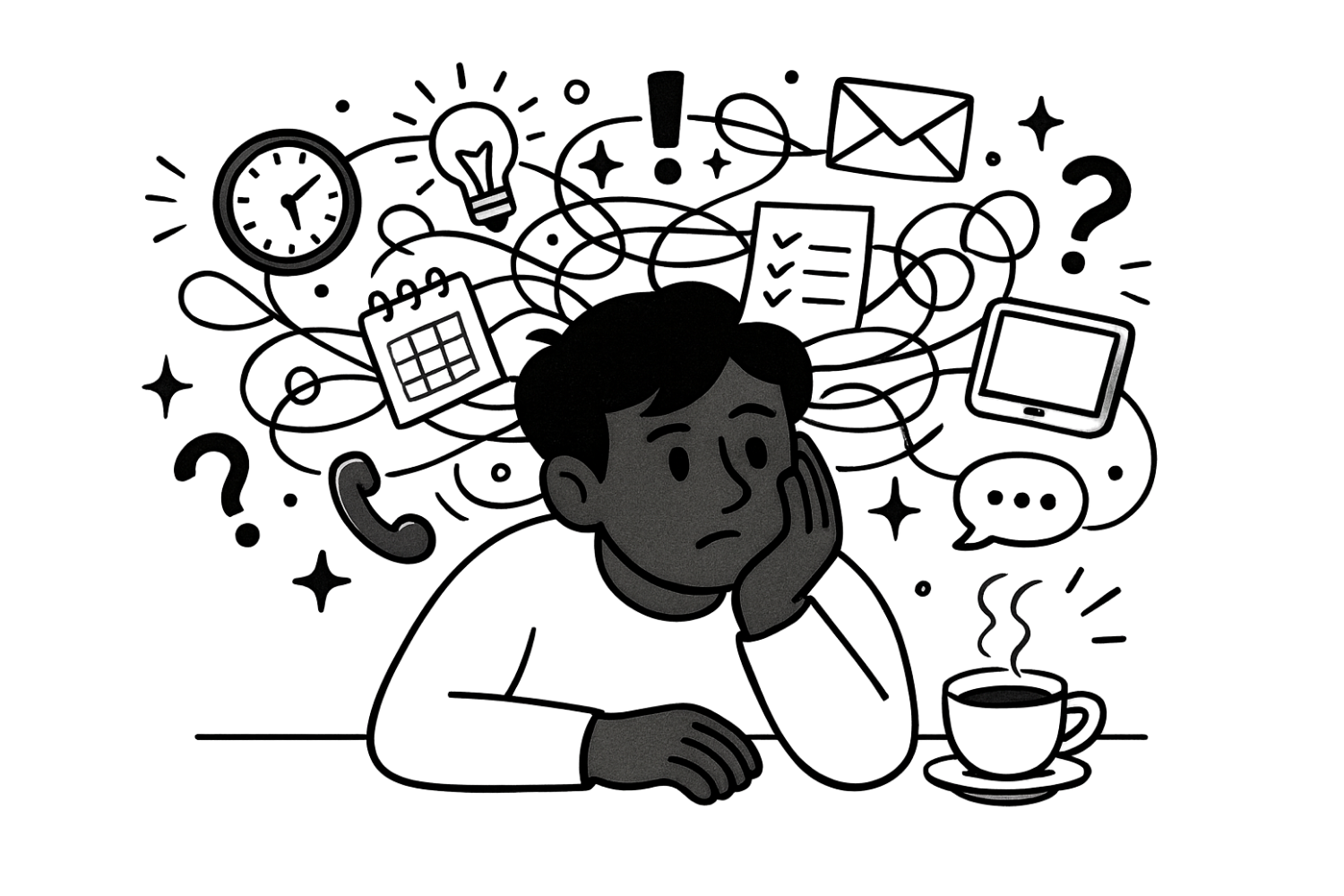Ever catch yourself scrolling through social media for the third time in an hour, or watching yet another episode when you meant to do something more...enriching? Your brain is basically sending you a message: "Hey, I'm bored up here! Give me something interesting to chew on!"
Here's the delightful truth: your brain absolutely loves a good puzzle. It lights up with the same joy a dog gets from a particularly excellent stick. And daily logic puzzles? They're like premium brain treats that happen to come with some pretty amazing side effects.
"But wait," you might be thinking, "aren't logic puzzles for super smart people who love math?" Nope! Logic puzzles are for anyone who's ever felt the satisfaction of figuring something out. If you've ever assembled IKEA furniture (and felt victorious), organized a junk drawer, or figured out the murderer in a TV show well before the reveal, you already have puzzle-solving skills. We're just going to give them a proper workout.
What Are Logic Puzzles? (Spoiler: They're More Fun Than They Sound)
Logic puzzles are basically games that reward you for being clever. Instead of relying on luck or memorizing random facts, you solve them through pure reasoning. Think of them as friendly brain challenges that always play fair.
Here's what makes them absolutely wonderful:
- They always have a solution – No trick questions or "gotcha" moments, just logical steps leading to a satisfying answer
- No sneaky guessing required – Every move you make should have a solid reason behind it
- Zero specialized knowledge needed – You don't need to know the capital of Kazakhstan or remember calculus from 1987
This is what sets logic puzzles apart from their puzzle cousins. Crosswords demand you know that "erne" is apparently a type of eagle (who keeps track of these things?). Word searches are basically visual hide-and-seek. Logic puzzles? They just ask you to think things through step by step.
The magic happens when you start with what looks like an impossible grid of emptiness and, through logical deduction, watch a perfect solution emerge. It's like being a detective, scientist, and magician all rolled into one incredibly satisfying experience.
The Brain Benefits: Why Your Gray Matter Will Thank You
And now, a brief moment for science: Research shows that regular puzzle solving can genuinely make your brain happier and sharper. The largest study to date, involving over 19,000 adults aged 50-93, found something remarkable: people who regularly engaged in word and number puzzles had significantly better cognitive function across multiple areas [Brooker et al., International Journal of Geriatric Psychiatry, 2019].
Here's what happens when you make daily logic puzzles part of your routine:
Your Working Memory Gets a Gym Membership: Logic puzzles are like mental juggling. You're keeping track of multiple clues, possibilities, and deductions all at once. This trains your brain to hold and manipulate more information, which comes in handy for everything from following complex recipes to remembering where you put your reading glasses.
You Become a Problem-Solving Ninja: Regular puzzle practice teaches you to break down complex challenges into manageable chunks. These skills don't stay in puzzle-land—they sneak into real life and help with everything from planning trips to troubleshooting technology.
Your Focus Gets Super Powers: In our age of constant notifications and distractions, the ability to concentrate deeply is becoming a rare skill. Puzzle solving requires sustained attention and trains your brain to focus deeply, a skill that transfers to other activities throughout your day.
Your Brain Stays Young: Here's the really exciting part. The University of Exeter research found that people who engage in word puzzles have brain function equivalent to ten years younger than their age on tests of reasoning, and eight years younger on memory tests. It's like finding the fountain of youth, except it's in a grid format.
But here's the secret sauce: consistency beats intensity every time. Your brain loves routine, and neuroplasticity (fancy term for your brain's ability to grow and change) thrives on regular practice.
The best part? Just 10-15 minutes daily can make a real difference. You're not committing to become a puzzle hermit, just giving your brain a daily dose of the good stuff.
Three Perfect Puzzles to Start Your Adventure
Ready to dive in? Here are three fantastic puzzle types that are absolutely perfect for beginners (and we promise they're more addictive than your morning coffee):
Stars: Your New Favorite Brain Teaser
Stars puzzles give you a grid and ask you to place stars according to some beautifully simple rules: no two stars can touch each other (not even corner-to-corner), and each row, column, and outlined region needs exactly the two stars.
What makes Stars absolutely perfect for beginners? It's like having a friendly puzzle mentor. Every star you place immediately tells you where other stars can't go, creating these wonderful "lightbulb moments" where the next logical step becomes crystal clear. You'll often find yourself thinking "I have no idea what to do next," then suddenly spotting the perfect move that unlocks half the puzzle.
The satisfaction factor is off the charts. Stars typically take 10-15 minutes to solve, making them perfect for a daily mental coffee break. Plus, there's something deeply pleasing about creating these perfect star patterns.
Start your Stars journey at Inkwell Games – we've crafted them especially for puzzle newcomers who want to fall in love with logic.
Fields: The Colorful Logic Adventure
Fields puzzles invite you to paint every square either green or blue, creating separate colored areas called "fields." Each field must contain exactly one number, and that number tells you how big the field should be. The twist that makes it interesting? Same-colored fields can never touch each other.
What makes Fields so delightful for beginners is how visual and intuitive it feels. You're not just moving numbers around—you're literally watching colorful patterns emerge as you solve. It's like painting with logic, combining spatial creativity with number reasoning in the most satisfying way.
Fields puzzles have this wonderful quality where the solution seems to bloom naturally from your deductions. Most take about 8-12 minutes to complete, making them perfect for those moments when you want a quick but engaging mental challenge.
Try Fields puzzles at Inkwell Games for a colorful twist on logic that's perfect for newcomers.
Sudoku: The Classic That Never Gets Old
Ah, Sudoku! The puzzle that conquered the world and probably lives in your newspaper. You fill a 9×9 grid so every row, column, and 3×3 box contains the numbers 1-9 exactly once.
Here's the beautiful secret about Sudoku: despite all those numbers, it's not actually about math. The numbers could be replaced with letters, colors, or tiny pictures of cats—they're just nine different things that need to be arranged according to the rules. It's pure logic dressed up in numerical clothing.
A typical puzzle takes 15-25 minutes, making it slightly longer than Stars or Fields but still perfect for daily practice. Plus, there's something satisfying about mastering a puzzle that millions of people worldwide enjoy.
These three puzzles offer different flavors of logical thinking, so you can find the one that clicks best with your brain. Or better yet, try all three and give your mind a well-rounded workout!
How to Start Your Daily Logic Puzzle Habit
Building a sustainable daily puzzle habit is easier than you might think. Here's your roadmap:
Week 1-2: Foundation Building
Start by choosing one puzzle type to focus on. Don't try to master everything at once. If Stars appeals to you, start there. If you're drawn to the familiar structure of Sudoku, begin with that.
Always start with the easiest difficulty levels. Your goal right now isn't to challenge yourself – it's to build confidence and understand the basic logic patterns. Aim for 10-15 minutes daily, and don't worry about speed. Feel free to use hints and checks; they’re both great ways to learn!
Week 3-4: Building Confidence
By now, you should notice improvement in your solving strategies. You'll start recognizing patterns and approaching problems more systematically. This is when you can gradually increase difficulty or try a second puzzle type.
Pay attention to how solving puzzles affects the rest of your day. Many people report feeling more focused and mentally "warmed up" after their daily puzzle session.
Month 2+: Establishing Routine
Once the habit feels natural, experiment with different puzzle types and find your optimal time of day. Some people love starting their morning with a puzzle to "wake up" their brain. Others prefer evening puzzles as a way to wind down from the day.
Consider joining online puzzle communities (like Inkwell Insiders) for motivation and tips.
Practical Tips for Success
Best times to puzzle: Most people find morning (brain activation) or evening (peaceful wind-down) work best, but experiment to find your preference.
Tools needed: Just a smartphone, tablet, or computer. Some people prefer pen and paper for the tactile experience.
When you get stuck: Take a short break and come back with fresh eyes. More ideas here for when you’re stuck on Stars!
Tracking progress: Note your solving times and difficulty levels. You'll be amazed how much you improve in just a few weeks.
Common Beginner Mistakes (and How to Avoid Them)
Learning from others' mistakes can accelerate your progress:
Starting too difficult: It's tempting to jump to harder puzzles, but this often leads to frustration and giving up. Build your foundation with easier puzzles first. Remember, Inkwell puzzles start easy on Monday and ramp up over the course of the week.
Guessing instead of reasoning: Every move in a logic puzzle should have a logical justification. If you find yourself guessing, step back and look for a logical deduction you might have missed.
Giving up too quickly: Getting stuck is part of the learning process. Some of the most satisfying moments come after working through a challenging section.
Focusing on speed over understanding: Accuracy and method matter much more than time, especially when you're learning. Speed will come naturally as you develop better pattern recognition.
Skipping tutorials: Most puzzle platforms offer guidance and tutorials. Use them! Understanding the basic strategies will save you hours of frustration. Check out our guides to Stars and Fields to get started.
Building Your Daily Practice
Creating a lasting habit requires intentional planning:
Creating the Habit
Link your puzzle time to an existing routine. Morning coffee, lunch break, or evening wind-down are all natural connection points. This "habit stacking" makes the new behavior more likely to stick.
Start small. Five to ten minutes of daily puzzle solving is infinitely better than sporadic 30-minute sessions. Consistency beats intensity when building cognitive benefits.
Use reminders initially. Set a daily alarm or add puzzles to your task list until the habit becomes automatic.
Celebrate small wins. Completed your first Friday difficulty? That's worth acknowledging. Solved a puzzle that stumped you yesterday? Take a moment to appreciate the progress.
Staying Motivated
Share your journey with family and friends. You might be surprised how many people are interested in starting their own puzzle habit.
Try new puzzle types periodically to keep things fresh. Once you've mastered Stars, exploring Fields or other logic puzzles can reignite your enthusiasm.
Focus on the mental clarity benefits rather than just puzzle completion. Notice how regular puzzle solving affects your focus, problem-solving, and overall mental sharpness.
Your Brain Training Journey Starts Today
Daily logic puzzles offer one of the most accessible and enjoyable ways to keep your mind sharp. You don't need special equipment, expensive memberships, or hours of free time. Just 10-15 minutes daily can provide measurable cognitive benefits.
Your brain has incredible capacity for growth and improvement at any age. Logic puzzles provide a structured, enjoyable way to tap into that potential. The person who starts with simple Stars puzzles today could be confidently solving complex logic challenges within months.
Remember: every expert was once a beginner. The difference is they took that first step.
Ready to start your brain training journey? Try our beginner-friendly Stars puzzle at Inkwell Games – designed specifically for newcomers to logic puzzles. Your future, sharper self will thank you.





.png)



